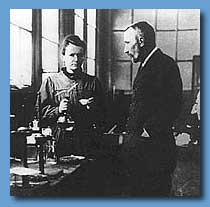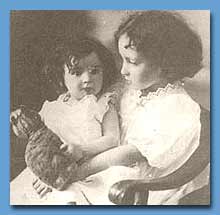|
After submitting
the results of her research to the Society for the Encouragement
of National Industry in the summer of 1897, she used part of her
payment to return the scholarship money she had received four years
earlier. She was not expected to do so, of course, but she wanted
to contribute to the education of some other worthy Polish student.
“Having
grown up in an atmosphere of patriotism kept alive by the oppression
of Poland, I wished, like many other young people of my country,
to contribute my effort toward the conservation of our national
spirit.”
|

|
| The Curies in the laboratory
in 1896. “At this time my husband was occupied with researches
on crystals,” she later wrote, “while I undertook
an investigation of the magnetic properties of steel.”
(Photo ACJC) |
|
 ARENTHOOD
SOON CHANGED the Curies' lives. In September 1897 their first
child, Irène, was born. Pierre's father, a physician, delivered the
baby. Just as she had done with the household budget from the time
of their marriage, Marie now began keeping records of every stage
of her daughter's development with the same meticulous care that she
used to keep track of her experimental work ARENTHOOD
SOON CHANGED the Curies' lives. In September 1897 their first
child, Irène, was born. Pierre's father, a physician, delivered the
baby. Just as she had done with the household budget from the time
of their marriage, Marie now began keeping records of every stage
of her daughter's development with the same meticulous care that she
used to keep track of her experimental work |
 |
|
Irène, age 8, and
Eve, age 1. Pierre Curie had so much respect for his wife's
scientific career that he never contemplated her abandoning
it, even in 1904 after a second daughter was born. (Photo
ACJC)
READ
Curie's words
|
|
Only
a few weeks after Irène's birth Dr. Curie lost his wife to breast
cancer, and he moved into a house at the edge of Paris with his son,
daughter-in-law, and granddaughter. With their expanded family the
Curies had to hire a servant to tend to chores. Marie, who remained
in charge of her child's care, found in Dr. Curie an ideal babysitter.
She could carry out her lab work fully confident that Irène was in
excellent hands. Over the years grandfather and granddaughter would
forge a very close bond.
“It
became a serious problem how to take care of our little Irène and
of our home without giving up my scientific work. Such a renunciation
would have been very painful to me, and my husband would not even
think of it...So the close union of our family enabled me to meet
my obligations.”
|
|
 Work
and Family
Work
and Family
 S
BUSY YOUNG PARENTS the
Curies had time, money, and energy for only two commitments, work
and family. They maintained warm ties with the family of Pierre's
older brother, Jacques, who taught mineralogy at the University
of Montpellier. They socialized infrequently, and then only with
other scientists who gathered at the Curie home on the rue Kellerman
or in its garden -- colleagues and students who shared their liberal
views and intellectual interests. Despite the satisfaction Marie
took in her busy and fulfilling life, she missed the Sklodowski
family, particularly after Bronya and her husband returned to Poland.
(The Dluskis opened a tuberculosis sanatorium in the Carpathians
of Austrian Poland.) S
BUSY YOUNG PARENTS the
Curies had time, money, and energy for only two commitments, work
and family. They maintained warm ties with the family of Pierre's
older brother, Jacques, who taught mineralogy at the University
of Montpellier. They socialized infrequently, and then only with
other scientists who gathered at the Curie home on the rue Kellerman
or in its garden -- colleagues and students who shared their liberal
views and intellectual interests. Despite the satisfaction Marie
took in her busy and fulfilling life, she missed the Sklodowski
family, particularly after Bronya and her husband returned to Poland.
(The Dluskis opened a tuberculosis sanatorium in the Carpathians
of Austrian Poland.)
“It
was under this mode of quiet living, organized according
to our desires, that we achieved the great work of our lives,
work begun about the end of 1897 and lasting for many years.”
|
With her household
in order and the results of her first research published, it was
time for Marie to choose a topic for her doctoral research. Although
an unmarried German woman's doctoral research in electrochemistry
was at an advanced stage, no woman anywhere in the world had yet
been awarded a doctorate in science.
� 2000 -
American Institute of Physics
|
|

